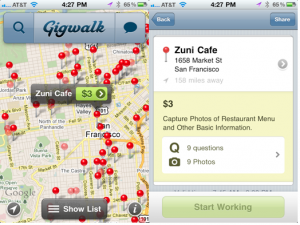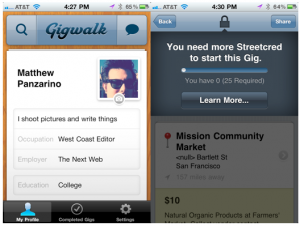Companies want to get third party information on their customer service, get local pricing information, map buildings and cities, and conduct various other market research projects. So, what better way to do this than to enlist the very individuals who live near and patronize their businesses and communities?
Gigwalk takes “secret shopping” mobile and has created an app (only available on the iPhone right now) to help connect companies with individuals who want to make an extra buck. “Gigwalkers” get paid to collect, capture, and report real-world data while going about their everyday activities. Currently, its clients range from Fortune 500 companies to small businesses across industries, including mapping, real-estate, local, travel, government, consumer research, and retail.
How it works
 A Gigwalker completes a variety of on-location, paid tasks to verify a street name, photograph a menu, report on traffic flow, confirm product placements in stores, and more. Completed Gigs are sent directly and instantly to the client company, complete with Gigwalker information and time-to-complete. The Gigwalker gets paid within seven days via PayPal. As a Gigwalker completes more assignments, they earn “streetcred” points, which allow them to view and complete higher-paying tasks (some up to $90).
A Gigwalker completes a variety of on-location, paid tasks to verify a street name, photograph a menu, report on traffic flow, confirm product placements in stores, and more. Completed Gigs are sent directly and instantly to the client company, complete with Gigwalker information and time-to-complete. The Gigwalker gets paid within seven days via PayPal. As a Gigwalker completes more assignments, they earn “streetcred” points, which allow them to view and complete higher-paying tasks (some up to $90).
Why we (sourcing and recruiting professionals) should pay attention
Gigwalk has already garnered a significant amount of notoriety. It is funded by some of the tech industry’s most successful venture capitalists, including AdMob investor Michael Dearing, Mint.com investor Jeff Clavier, and LinkedIn co-founder Reid Hoffman. The company, which just opened to the public earlier this month but had launched in late 2010 in a private-beta, is co-founded by Ariel Seidman, Matt Crampton, and David Watanabe. All three men worked at Yahoo! prior to founding Gigwalk — Seidman was Director Product Management – Mobile Search, Crampton a Senior Software Engineer, and Watanabe an Experience Designer. These guys know search and the value of data collection.
Additionally, the company has been featured in several prominent publications, including TechCrunch, which noted that Gigwalk “can be used to recommend gigs, recommend workers to employers based on their productivity, or a host of other features to make the service work better for both parties.” Emphasis mine — and potentially yours, as well.
 I believe there is some sourcing value here — but not in the traditional way you may think of “sourcing value.” If your company is willing to make an investment in putting forth some Gigs, there is a “try before you buy” opportunity. For example: you could throw out a customer service Gig to evaluate customer experience, but don’t stop there — ask what the Gigwalker would do differently to make the customer experience better. Or, you could have a developer evaluate a new app or a GIS professional develop a map of a certain area and consider hiring them based on their “streetcred” or accuracy in completion of many projects. I suggested to Gigwalk that a great added feature to their app would be giving Gigwalkers the ability to submit a resume to a company once they’ve either completed a certain number of tasks or earned a certain level of streetcred. In the meantime, Gigwalker user data is available to client companies, giving them the opportunity to see what types / how much local talent is available in various market areas. Great for competitive intelligence gathering (a subskill for recruitment sourcing), if you ask me.
I believe there is some sourcing value here — but not in the traditional way you may think of “sourcing value.” If your company is willing to make an investment in putting forth some Gigs, there is a “try before you buy” opportunity. For example: you could throw out a customer service Gig to evaluate customer experience, but don’t stop there — ask what the Gigwalker would do differently to make the customer experience better. Or, you could have a developer evaluate a new app or a GIS professional develop a map of a certain area and consider hiring them based on their “streetcred” or accuracy in completion of many projects. I suggested to Gigwalk that a great added feature to their app would be giving Gigwalkers the ability to submit a resume to a company once they’ve either completed a certain number of tasks or earned a certain level of streetcred. In the meantime, Gigwalker user data is available to client companies, giving them the opportunity to see what types / how much local talent is available in various market areas. Great for competitive intelligence gathering (a subskill for recruitment sourcing), if you ask me.
Still limited
Gigwalk is only active in seven major metropolitan areas at the moment: Los Angeles, San Francisco, New York City, Chicago, Philadelphia, Boston, and Miami. You can vote for your city to be included, however, once you sign up as a Gigwalker. I’m personally hoping that more folks with vote up the Seattle area…
Why pay for things that people do already for free?
Like I’m sure many of you may be thinking, my initial reaction to tasks like photographing a menu or products within stores was that people do this anyway — why would companies want to pay for stuff that people do for free? As well, there is also the added value of an unpaid user video or photo of your product/service going viral. However, the answer, at least in my mind, has to do with quality, findability, and honesty.
As a researcher, I can find stuff quickly that might take other people a long time to find. In this case, companies could certainly employ individuals to surf the Web and find where people have taken photos of their store/product/etc., contact them, ask to use the photo, and so forth. But why spend the effort to go through all this when you can simply throw out a $3 “Gig” and be flooded with higher quality, self-designated photographers that will push the information you’re looking for directly to you? As well, without earning “streetcred,” that is, completing tasks honestly and with quality, Gigwalkers will not be able to advance to higher earning levels, thus taking care of the concerns of quality and honesty.
Goes to show that “cost” is not always tied to a monetary value. In my opinion, the “cost” of “free” in this case far outweighs the “cost” of paying a small fee for a “Gig” — essentially, the cost of convenience.
In what creative ways do you think your company could use Gigwalk? If you live within one of the currently active metro areas, I would encourage you to give it a shot — both from a Gigwalker standpoint as well as a client/employer. Please share your experiences with us in the comments below.
